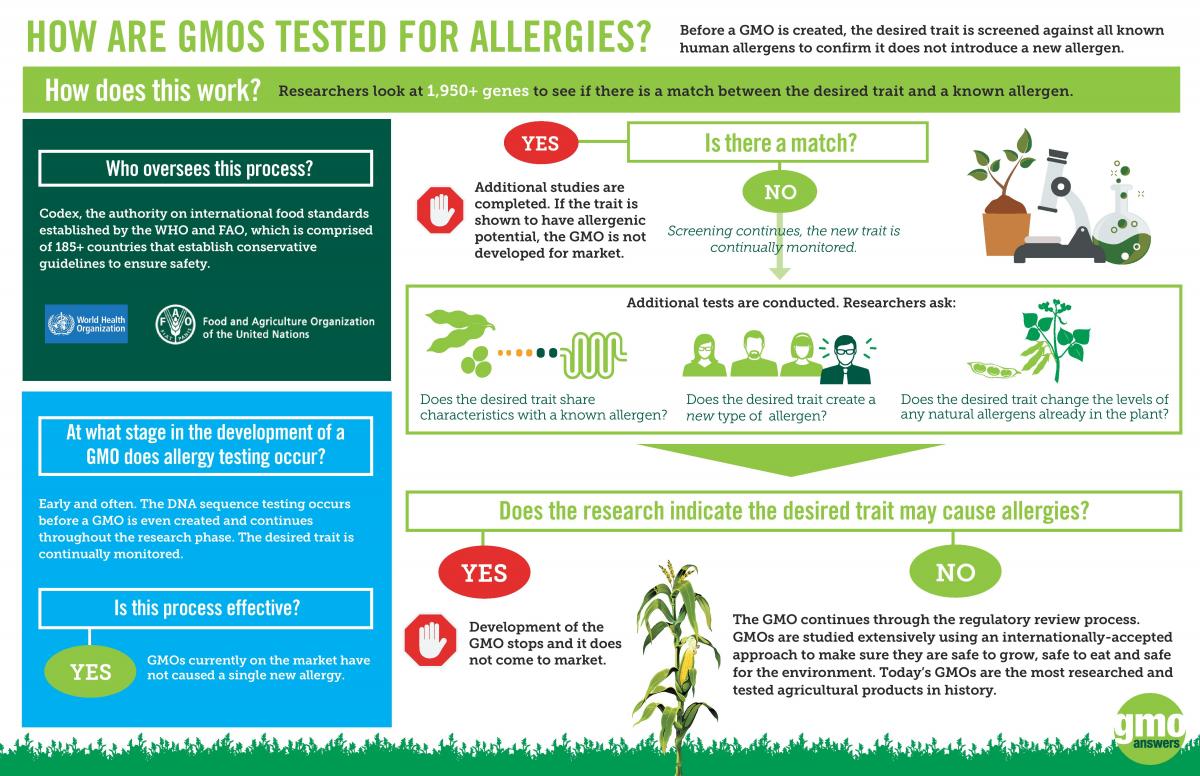Question
Is there ways to improve gmos to stop people from having allergic reactions?
Submitted by: Kacey Limbach
Answer
Expert response from Community Manager
Moderator for GMOAnswers.com
Monday, 30/04/2018 15:02
Allergic reactions – the body’s immune response to a trigger to food or other irritants - can be caused by many different substances in food products. The allergic response to food, however, is not linked to food because it is GMO.
Lisa Katic, RD, answered this question by explaining that “No commercially available crops contain allergens that have been created by genetically engineering a seed/plant. And the rigorous testing process ensures that will never happen.”
In another post, Lisa goes on to say, “food allergies are mainly caused by eight major foods (milk, eggs, peanuts, tree nuts, soy, wheat, fish and shellfish) and account for about 90 percent of reported food allergies in the United States. First, it is important to note that only one of these eight major allergens listed above is a potential product of biotechnology, and that is soy. Of the remaining seven allergens listed, none is commercially available in genetically modified varieties.”
It is important to remember that if a person is allergic to a non-GM plant, he or she will also be allergic to the plant’s GMO counterpart. But GMOs do not introduce any new allergens. In fact, researchers, academics and companies are working on new GMOs that have the potential to help people in this area—for example, peanuts with very low allergen levels that have the potential to eliminate life-threatening allergies to peanuts. More information is available here and here.
Additionally, the U.S. Food and Drug Administration explains, “Evaluating the safety of food from a genetically engineered plant is a comprehensive process that includes several steps. Generally, the developer identifies the distinguishing attributes of new genetic traits and assesses whether any new material that a person consumed in food made from the genetically engineered plants could be toxic or allergenic.”
Before a GMO is created, the desired trait is screened against all known human allergens to confirm it does not introduce a new allergen. Check out this infographic to learn how researchers look at over 1,950 genes to ensure quality and safety.

If you have more questions about GMOs and allergies, check out these answers:
- What are the effects of GMOs on the human body? Has GMO foods led to an increase in the development of allergies among certain groups of people? Answered by Connie Diekman here.
- Is there good evidence that inserting genes of allergenic organisms into those that don’t normally contain them will not cause allergic reactions in people sensitive to specific allergens, e.g. soy? Answered by Lisa Katic here.
Answer
Expert response from Ruth MacDonald
Professor and Chair, Food Science and Human Nutrition, Assistant Dean of Graduate Programs, College of Agriculture and Life Sciences, Iowa State University
Monday, 30/04/2018 14:55
There has never been a confirmed case of an allergic response to a GMO food. The FDA requires that any GMO trait must be shown to be non-allergenic before it can be released to the food system. People may have an allergic reaction to a food, such as soybean or corn. But these responses are due to natural proteins in these foods, not the genetic trait.
GMO Innovation Contest Recap!
